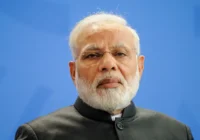The Modi-led BJP government has emulated Indira Gandhi and emasculated the economy, causing burning resentment among core supporters.
Once upon a time, not a very long time ago, the Indian economy was mired in the Hindu rate of growth. The notorious license-permit-quota raj starved the economy of oxygen, perpetuating pernicious poverty by imposing Soviet-style economics through a colonial bureaucracy. Pertinently, bureaucrats, not businessmen or entrepreneurs, decided what would be produced, which company would produce it and even when would it do so. The result was not quite an unmitigated disaster but close.
The story of Indian growth after the fall of the Soviet Union in 1991 is now almost a cliché. India mortgaged its gold, went with a begging bowl to the International Monetary Fund (IMF), opened up its economy and, voila, the economy boomed. Today, Indian newspapers crow incessantly about ever higher growth figures. If one were to believe them, a wave of vikas, the Indian term for development, is sweeping this ancient, time-worn land.
It is pertinent to note that Indian Prime Minister Narendra Modi was elected in 2014 on the promise of vikas. If that promise has been fulfilled, then he should be in pole position to win the 2019 election that is now just a few months away. Yet not all is well in South Block, the fabled British-built resplendent office of the prime minister.
Modi’s Bharatiya Janata Party (BJP) has lost elections in three states. Its chief ministers have been booted out, including Shivraj Singh Chouhan, a backward caste leader like Modi whom many have touted as a future prime minister. While the BJP is underplaying its losses, the defeat has been seismic. So much so that it has brought in reservation for supposedly poor upper castes, much like Vishwanath Pratap Singh, the politician who replaced Rajiv Gandhi as prime minister in 1989 and earned his claim to fame by reserving a percentage of government jobs and seats in universities for backward castes.
WHY IS BJP LOSING DESPITE VIKAS?
The answer might be best expressed in the words of James Carville, Bill Clinton’s campaign strategist: “The economy, stupid.” As many know, there are lies, damned lies and statistics. In India’s case, rosy growth figures fail to capture acute pain on the ground. Modi has dragged the economy screaming and kicking through two major disruptions.
The first disruption was demonetization that Modi declared out of the blue on November 8, 2016. The following year, the BBC asked an economic analyst to look at the data of the Reserve Bank of India (RBI) and called it “a failure of epic proportions.” The prime minister declared demonetization to rid the economy of black money, wealth accumulated through avoidance of taxes. No less than 99% of this money came back to the banks making a mockery of Modi’s declaration. Instead of curbing the black economy, Modi’s ad hoc measure sucked liquidity out of the market, wrecked small businesses and destroyed employment in the country.
Furthermore, Modi failed to reform any of the underlying causes that lead to corruption. It is a well-known secret that India’s colonial-era laws and socialist-era legislation are utterly out of sync with ground realities. If these laws were truly imposed, the Indian economy might grind to a halt in a day. Modi neither repealed key outmoded laws nor reformed poorly drafted ones, ensuring that doing business in India necessitates creative interpretation, if not transgression, of the law.
If the law is an ass, the bureaucracy is worse. This colonial-era construct has always had the “sahib syndrome.” It is repressive and extractive in its DNA. It seeks to rule, not to serve. It is a very blunt instrument to achieve policy goals. During demonetization, the bureaucracy confounded citizens with repeated circulars that attained notoriety for their muddled thinking and poor drafting. It is fair to say that the Modi government has been going around in circles ever since and the economy has unsurprisingly gone for a toss.
The second disruption to the economy was the imposition of the goods and services tax (GST). Initially, this was an idea of the Indian National Congress party and Modi opposed it as chief minister of Gujarat. However, he adopted it with great gusto as prime minister and pushed it through despite much opposition. In more ways than one, the GST is a jolly good idea. However, the devil lies in the details. The GST legislation was drafted with what is often termed “gulabi English and jalebi logic” with a convoluted multiplicity of rates and filing of numerous returns. Simplicity, clarity and certainty, the hallmarks of good legislation, were conspicuous by their absence.
 If poor drafting was not enough, bureaucratic bungling added to the misery of the small trader. Like Indira Gandhi, another strong prime minister and the grandmother of Congress leader Rahul Gandhi, Modi believes in ruling through pliant bureaucrats with no domain expertise. These worthies have imposed such strangulating red tape through the GST that small businesses are struggling to survive, if they have not already gone bankrupt.
If poor drafting was not enough, bureaucratic bungling added to the misery of the small trader. Like Indira Gandhi, another strong prime minister and the grandmother of Congress leader Rahul Gandhi, Modi believes in ruling through pliant bureaucrats with no domain expertise. These worthies have imposed such strangulating red tape through the GST that small businesses are struggling to survive, if they have not already gone bankrupt.
Entrepreneurs and businessmen complain that they have spent more time proving their innocence to an inquisitorial government instead of running or growing their business. The government is simply delaying refunding small businesses the money that is theirs, creating a dire cash flow crisis that is driving them to despair. Remember, it is small and medium enterprises that provide most of the jobs in the country. Amazon, Google or Infosys hire a handful of people by comparison. And by squeezing the smaller players, Modi’s bureaucrats have destroyed jobs in the country.
BUT WHAT ABOUT THE IMPRESSIVE ECONOMIC FIGURES?
India’s growth figures are indeed impressive and have finally nudged ahead of China’s. Even if creative accounting has boosted these figures, they are still impressive. Despite the buoyant figures, there are flies in ointment.
The Indian economy has long suffered from the Lord Voldemort problem. For the few who have not read Harry Potter, Voldemort is the Dark Lord or He Who Must Not Be Named, a most fearsome archvillain. Voldemort is the reigning deity of India’s black economy that some economists estimate to be as high as 62% of the GDP. To put this into perspective, agriculture and industry put together form 39% of GDP. The share of both India’s central government and 29 state ones is 27% of GDP.
Historically, this informal sector has never showed up in direct taxes or other official economic data. However, its strength has been indirectly reflected through real estate prices and consumption figures for cars, white goods, gold and more. Tellingly, car sales remained subdued even during Diwali season. Indians typically buy cars during this festival of lights and companies tried to lure them with hefty discount sales. Two months ago, these did not work because of “weak buyer sentiments, higher insurance cost, vehicle price hike and liquidity crunch.”
A key unmentioned reason for declining car sales is the dire state of the black economy. When we speak to traders, businessmen and entrepreneurs, they offer the same view. They tell us that the informal sector is in deep trouble and many do not know how long they can stay afloat. Some may say this is good news in the long run. Having said that, this pressure on the informal sector is causing severe structural dislocation in the economy and causing pain to millions across the country.
Pertinently, traders have been a core support group of the BJP and could well turn against the ruling party. So could others who are struggling to find jobs or make ends meet. Additionally, exports are declining, banks are in bad shape and markets are “facing more downsides than upsides.”
Democracies tend to be unforgiving of economic pain, which spells trouble ahead for Modi and the BJP.
The views expressed in this article are the author’s own and do not necessarily reflect Fair Observer’s editorial policy.
Support Fair Observer
We rely on your support for our independence, diversity and quality.
For more than 10 years, Fair Observer has been free, fair and independent. No billionaire owns us, no advertisers control us. We are a reader-supported nonprofit. Unlike many other publications, we keep our content free for readers regardless of where they live or whether they can afford to pay. We have no paywalls and no ads.
In the post-truth era of fake news, echo chambers and filter bubbles, we publish a plurality of perspectives from around the world. Anyone can publish with us, but everyone goes through a rigorous editorial process. So, you get fact-checked, well-reasoned content instead of noise.
We publish 2,500+ voices from 90+ countries. We also conduct education and training programs
on subjects ranging from digital media and journalism to writing and critical thinking. This
doesn’t come cheap. Servers, editors, trainers and web developers cost
money.
Please consider supporting us on a regular basis as a recurring donor or a
sustaining member.
Will you support FO’s journalism?
We rely on your support for our independence, diversity and quality.






